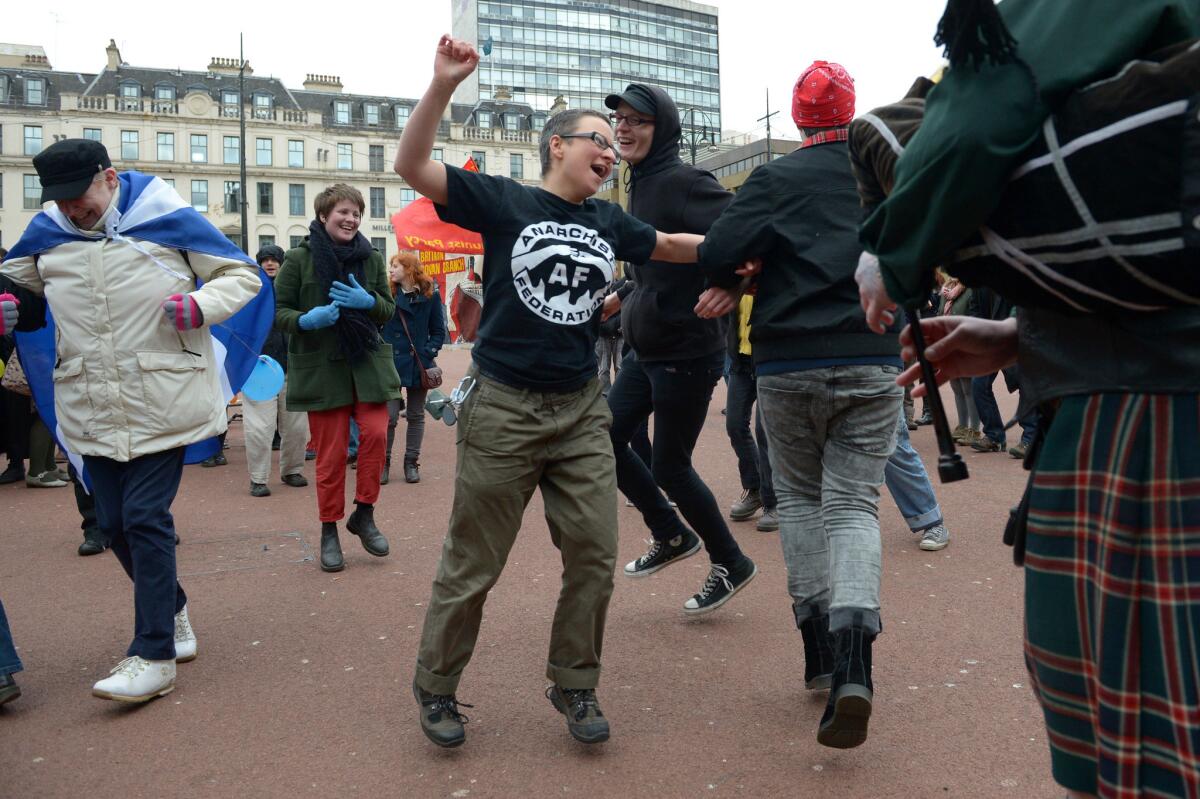Thatcher critics recall labor battles, Irish strife [Talkback]

LONDON -- It perhaps goes without saying that the death of former Prime Minister Margaret Thatcher did not prompt universal mourning. She could be a polarizing figure, nowhere more than in working-class communities of northern England, Scotland and Wales, where residents bitterly recall the fierce fights against her closure of Britain’s mines in the 1980s, actions that caused thousands to lose their livelihoods.
The National Union of Miners posted a few words of condolence to the Thatcher family, but followed it with a reminder: “The legacy of what the Conservative government did to British industry under Thatcher is not one to be proud of if you really did want the best for the people.”
The working class had suffered “decimation” in the name of the free market, the message said, adding that “Thatcher lived long enough to see her beliefs demolished when the ‘free market’ collapsed and came running to the state for support. Unlike the banks who gambled, cheated and were bailed out -– coal mines were closed and communities were left to suffer … the damage caused by her fatally flawed politics sadly lingers on.”
PHOTOS: Margaret Thatcher | 1925 - 2013
David Hopper, general secretary of the Durham Miners’ Assn., told reporters that Thatcher’s death came on his 70th birthday and “it looks like one of the best birthdays I have ever had.”
“There’s no sympathy from me for what she did to our community. She destroyed our community, our villages and our people. For the union this could not come soon enough and I’m pleased that I have outlived her.”
Some critics were more measured.
In Wales, where coal mining had thrived before its decline during the Thatcher era, a former Labor Party minister, Kim Howells, acknowledged that she was “a pretty remarkable woman.”
“She was extremely divisive, but she changed the country,” said Howells, who was research officer for the National Union of Mineworkers during the contentious miners’ strikes of the 1980s. Still, he criticized her “lack of sensitivity” in the treatment of Welsh mining communities.
TIMELINE: Margaret Thatcher| 1925 - 2013
Closer to home, former London Mayor Ken Livingstone, whose socialist views earned him the nickname “Red Ken,” said Thatcher’s policies were still being felt -- and he didn’t mean it as a compliment.
“She created today’s housing crisis, she produced the banking crisis, she created the benefits crisis,” he said in remarks to Sky News. “It was her government that started putting people on incapacity benefits rather than register them as unemployed because the Britain she inherited was broadly at full employment.”
“She decided when she wrote off our manufacturing industry that she could live with 2 or 3 million unemployed and the legacy of that, the benefits bill that we are still struggling with today,” he continued. “In actual fact, every real problem we face today is the legacy of the fact she was fundamentally wrong.”
Other critical voices came, not surprisingly, from Northern Ireland, where Gerry Adams, leader of the Sinn Fein movement of Irish Republicans, said Thatcher had brought “great hurt to people in Britain ... but also to people here in Ireland.” He recalled what he termed a “draconian policy of militarism” during the 1980s, when British troops fought against militant anti-British Republicans to control the streets of Belfast.
“Margaret Thatcher will be especially remembered for her shameful role during the epic hunger strikes of 1980 and ‘81,” said Adams, recalling the death in prison of IRA hunger striker Bobby Sands.
Thatcher and those close to her were prime IRA targets. In 1979 an IRA car bomb killed her chief aide, Airey Neave, and another close aide, Ian Gow, was killed in 1990 by an IRA bomb. In 1984, Thatcher herself narrowly escaped a bomb explosion that claimed several victims at a hotel where she was staying in Brighton.
Does Thatcher deserve the criticism? Tell us what legacy you think she leaves in the comment section below, or tweet @latimesworld using the hashtag #Thatcher.
ALSO:
Conservatives mourn, praise ‘hero’ Margaret Thatcher
Margaret Thatcher: Global reactions to passing of ‘Iron Lady’
Margaret Thatcher, Britain’s first female prime minister, dies at 87
Stobart is a news assistant in The Times’ London bureau.
More to Read
Sign up for Essential California
The most important California stories and recommendations in your inbox every morning.
You may occasionally receive promotional content from the Los Angeles Times.










